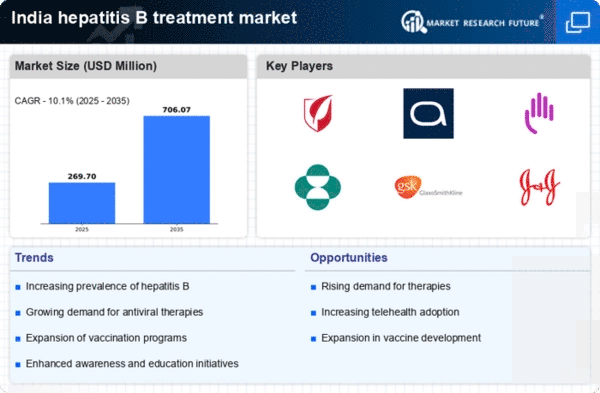Rising Healthcare Expenditure
The increase in healthcare expenditure in India is a significant driver for the hepatitis b-treatment market. As the government and private sectors invest more in healthcare, the availability of resources for hepatitis B treatment is likely to improve. According to the National Health Accounts, healthcare spending in India has been steadily rising, reaching approximately 4.2% of GDP. This increase in funding allows for better access to antiviral therapies and comprehensive treatment programs. Moreover, as more individuals gain health insurance coverage, the financial burden of hepatitis B treatment may decrease, encouraging more patients to seek care. Consequently, the hepatitis b-treatment market is expected to benefit from this upward trend in healthcare investment.
Government Initiatives and Funding
Government initiatives aimed at combating hepatitis B significantly influence the hepatitis b-treatment market. The Indian government has launched various programs to enhance screening, vaccination, and treatment accessibility. For instance, the National Health Mission allocates substantial funding to improve healthcare infrastructure and provide affordable treatment options. This financial support is crucial in ensuring that antiviral medications are accessible to a broader population. Additionally, public health campaigns aimed at educating citizens about hepatitis B are likely to increase treatment uptake. The government's commitment to eradicating hepatitis B by 2030 aligns with the growing investment in healthcare resources, which could further stimulate the hepatitis b-treatment market.
Growing Pharmaceutical Innovations
The hepatitis b-treatment market is experiencing a surge in pharmaceutical innovations, which is likely to enhance treatment options available to patients. Recent developments in antiviral drugs, such as tenofovir and entecavir, have shown promising efficacy in managing hepatitis B. These innovations not only improve patient outcomes but also expand the market by attracting new entrants and fostering competition. Additionally, ongoing research into combination therapies and potential vaccines may further revolutionize treatment paradigms. As pharmaceutical companies invest in research and development, the hepatitis b-treatment market is expected to witness a diversification of treatment options, ultimately benefiting patients and healthcare providers alike.
Increasing Prevalence of Hepatitis B
The rising incidence of hepatitis B in India is a critical driver for the hepatitis b-treatment market. According to the National Viral Hepatitis Control Program, approximately 40 million individuals are living with chronic hepatitis B in the country. This alarming statistic underscores the urgent need for effective treatment options. The increasing prevalence is likely to propel demand for antiviral therapies and other treatment modalities. Furthermore, the growing burden on the healthcare system may lead to increased government and private sector investment in hepatitis B management. As awareness of the disease spreads, more patients are expected to seek treatment, thereby expanding the market. The hepatitis b-treatment market is poised for growth as healthcare providers respond to this pressing public health challenge.
Advancements in Diagnostic Technologies
Technological advancements in diagnostic tools are transforming the hepatitis b-treatment market. Enhanced screening methods, such as nucleic acid testing and rapid antigen tests, facilitate early detection of hepatitis B. Early diagnosis is essential for effective treatment and management, as it allows for timely intervention. The introduction of point-of-care testing devices is particularly beneficial in rural areas, where access to healthcare facilities may be limited. These innovations not only improve patient outcomes but also drive demand for subsequent treatment options. As diagnostic technologies continue to evolve, they are expected to play a pivotal role in shaping the hepatitis b-treatment market, ensuring that more individuals receive appropriate care.
















